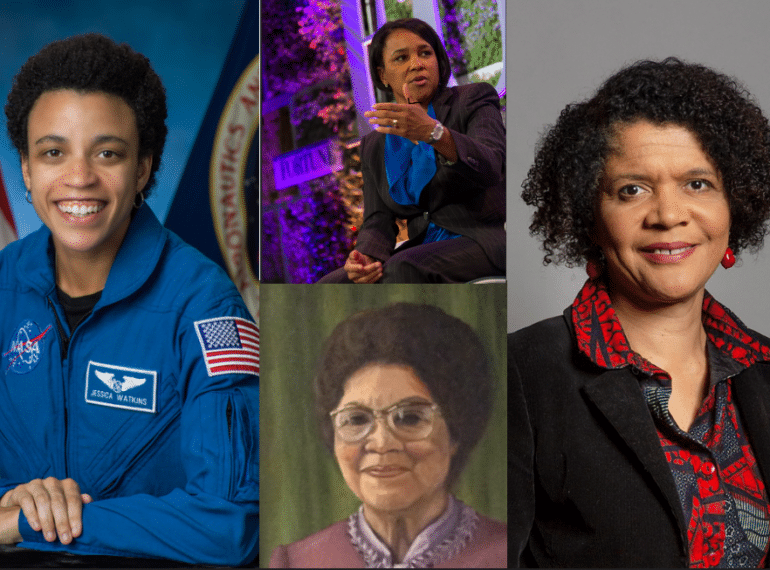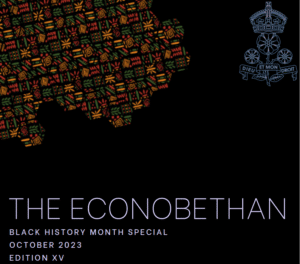“Saluting our sisters”: QE magazine spotlights high achievers in Black History Month

In its first edition of the academic year, the Econobethan celebrates four remarkable Black women – an astronaut, economist, businesswoman and MP – while also looking at the legacy of slavery in the US.
 The special section devoted to Black History Month is followed by articles on Economics – including a look at the economic impact of AI – and Politics – where pupils express some forthright views on Prime Minister Rishi Sunak’s recent easing of green commitments.
The special section devoted to Black History Month is followed by articles on Economics – including a look at the economic impact of AI – and Politics – where pupils express some forthright views on Prime Minister Rishi Sunak’s recent easing of green commitments.
The Econobethan is a pupil-run magazine from the Economics department. This fifteenth edition is the swansong for Year 13 editors Aditya Kute, Nishanth Bhasuru, Aston Daniel and Avinash Srivastava.
Economics teacher Celia Wallace said: “My thanks go to Aditya and his team for a strong edition and an excellent year.”
In their introductory editors’ note, the four-strong team write: “A topic that remains a staple within our publication is the contribution of people of colour to economics. Therefore, in commemoration of the 36th Black History Month, we have allocated a dedicated section to enhance comprehension of black history as a whole.”
In the first article, entitled Black History Month 2023 — Saluting Our Sisters, Aditya profiles three women:
- Jessica Watkins, who in April 2022 became the first Black woman to complete a long-term mission on the International Space Station
- Rosalind Brewer, who was appointed as CEO of US pharmacy store chain Walgreens in March 2021, thus becoming only the third Black woman ever to lead a Fortune 500 company on a non-interim basis
- Chi Onwurah, Labour MP for Newcastle upon Tyne Central, who entered politics after a high-flying career in the technology and telecommunications sector.
Nishanth’s article on Sadie T M Alexander, a pioneering 20th-century African American economist and civil rights activist, is followed by Aston’s exploration of How Slavery’s Economic Echo Shapes America Today and Avinash’s look at contemporary Black economist William Darity.
The Economics section featured Year 13 pupil Soumil Sahjpall’s consideration of cryptocurrencies and whether they are being manipulated. He urged that investors should exercise caution and diversify their portfolios, stating that “whether in cryptocurrencies or traditional investments, the game is the same…The house may not always win, but it possesses significant advantages.”
The section featured two articles on AI – Year 12 boy Akheel Kale’s exploration of whether it will reshape the labour market, and Zaki Mustafa and his fellow Year 12 pupil Uday Dash’s examination of the economic impacts of adopting AI.
Akheel also delved into Economics theory, along with Year 12 pupil Shreyaas Sandeep. Shreyaas explored Game Theory and the Nash Equilibrium, while Akheel’s topic was Neuroeconomics: Better than Behavioural Economics? Tejas Banal, of Year 12, asked Are the High Wages for Top-Tier Sportspeople Justified?
In the Politics section – described by the editors as “robust” – Saim Khan, of Year 12, thought through the question Would Democracies be Better Off Without Political Parties? and concluded with a resounding negative.
The final three articles all had environmental matters in mind. Shyam Jayabal, of Year 13, asked whether the Bank of England’s remit should be updated to address climate change challenges. Saim had the Prime Minister in his sights with his piece entitled Rishi’s Reckless Reversal on Green Commitments. And Year 12’s Dheeraj Karnati homed in on a specific item of Government policy – the recent delaying of the ban on the sale of petrol and diesel cars from 2030 to 2035 – with his piece, An In-Depth Analysis of the UK’s Trade Policies in the EV [Electric Vehicle] Market, in which he outlined the “worrying” situation in which “the Government unintentionally forced domestic car manufacturers to essentially subsidise their Chinese competitors whilst these competitors turn their attention to the UK and flood the market with their cheaper cars”.
